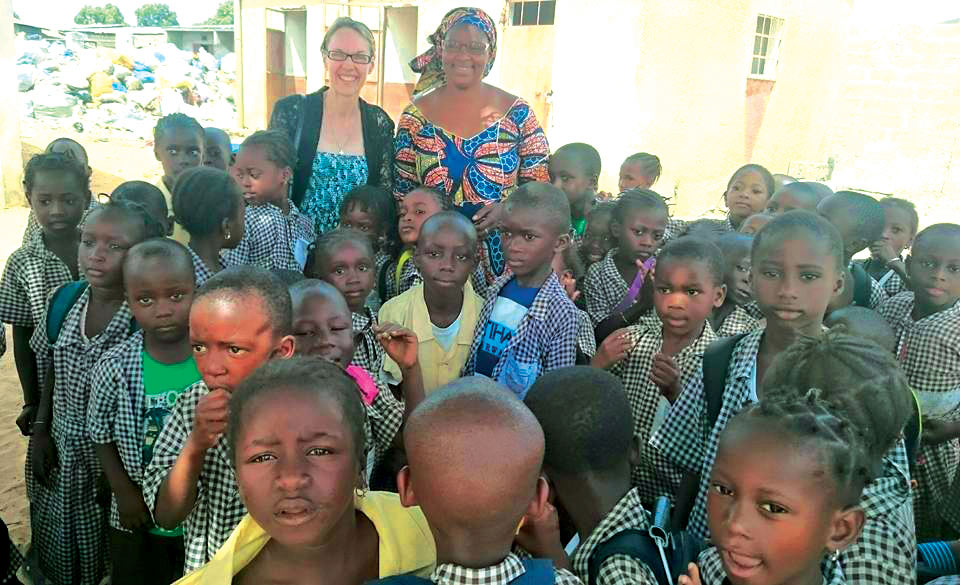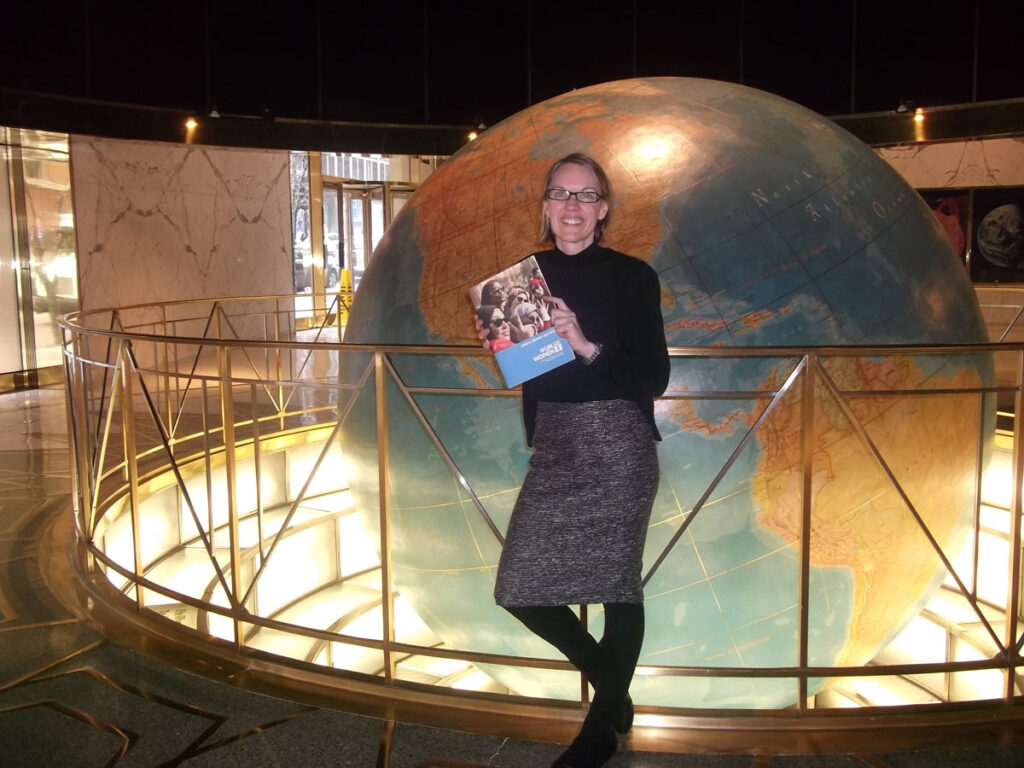A call to action:
Two decades of fighting to end Female Genital Mutilation
Photo: Mission partner Ann-Marie Wilson with a headteacher and pupils in a school in Kenya, on one of many trips raising awareness and sharing skills
Human suffering has a way of overwhelming us, often leaving us asking, “how can I make a difference?” But for some, unimaginable pain isn’t a barrier – it’s a call to action.
In 2005, while lamenting the suffering of millions of women impacted by Female Genital Mutilation (FGM) and forced marriages, CMS mission partner Ann-Marie Wilson asked God: “Who will help girls like this?” To her amazement, the answer came back as an audible voice: “You will.”
Two decades later, Ann-Marie is still answering that call. Through her international organisation, 28 Too Many, she has gathered the stories of over 3,000 FGM survivors and built a global movement dedicated to ending FGM worldwide and advocating for women’s reproductive health.
We pause to celebrate her achievements and thank her for her long-term service as a CMS mission partner.
Here are some of the people and places that have shaped her world-wide fight.
The girls who launched a movement
Fatima: The catalyst
Ann-Marie’s fight began with an encounter that forced her face-to-face with unimaginable suffering. In 2005, she and her team found Fatima, a 10-year-old girl, alone and seven months pregnant following a rape by militia in the scrubland of West Darfur.
They rushed her to a clinic where a caesarean section saved her life. As Fatima recovered, Ann-Marie learned more about the devastating health complications that followed her FGM experience at age five. Fatima’s desperate circumstances echoed the biblical words, “for such a time as this,” from Esther 4:14. Her story was Ann-Marie’s Esther moment, serving as the launchpad for a mission to free girls from FGM and the forced marriages that often follow.
Hannah and Grace: changing a community’s mind
Just 10 and 12 years old, Hannah and Grace shifted an entire community’s view on FGM.
When famine struck Kenya, their families relocated to a new settlement. The move allowed the girls to start attending school, where they learned about FGM practice’s illegality and severe health consequences.

The girls immediately planned to run away, seeking refuge with relatives. They bravely refused to return home until they were guaranteed safety from FGM. Their courage forced the community chiefs to meet, who guaranteed the girls would be heard. Hannah and Grace addressed the entire community, which, convinced by their testimony, decided then and there to never perform FGM again. No girl younger than them in their community has been cut since.
Mary: breaking the cycle
Mary’s life shows how devastating cycles of harmful practices can be stopped. As a teenager, her mother convinced her that FGM was a harmless procedure that would bring glory and respect. Mary eagerly awaited her turn to be cut, but her eagerness turned to terror. She spent a full month recovering.
Married at 19, Mary began to understand the full extent of the lies she’d been told when she required surgical intervention to safely deliver her first child. Eventually, her husband abandoned her and their three children. Through this ordeal, Mary came to understand that her value existed far beyond her relative worth to a man.
Now an anti-FGM activist, Mary helps run alternative rite of passage ceremonies, replacing the harmful practice with a celebration of womanhood.
Lydia: lasting educational impact
Anti-FGM efforts are often hindered by cultural taboos and a lack of open discussion about female sexuality. Recognising this knowledge gap, Lydia, a British teacher, volunteered her summer to help educate educators in Uganda.
While running safeguarding workshops in rural southwestern Uganda, Lydia made a startling discovery: only one in 20 teachers had any knowledge of FGM. Lydia trained them on how to recognise girls who had been subjected to the practice and prevent potential complications. A year later, she returned to find the teachers had successfully implemented improved school policies and safety measures.
Her dedicated work was later scaled up into a nationwide programme promoting girls’ education and preventing female students from dropping out of school after puberty.
Global impact: from New York to Kenya
Ann-Marie and the 28 Too Many team haven’t just changed individual lives; they’ve shifted global policy and fostered grassroots change across continents.
The UN: securing the Sustainable Development Goal
In 2012, Ann-Marie set her sights on a monumental task: ensuring FGM was included in the final document of a major gathering in New York at the full Commission on the Status of Women with over 10,000 attendees. Her team worked relentlessly: holding seminars, asking questions at key events, addressing world leaders and handing literature to dignitaries. After seven days of non-stop work, she got the result she wanted.

“Those three small letters FGM are now in the document, and therefore in the Sustainable Development Goals,” Ann-Marie says. “This is one of my greatest achievements.”
Her work secured its place in Sustainable Development Goal 5.3: ‘Eliminate all harmful practices, such as child, early and forced marriage and female genital mutilation.’
West Africa: outreach and media
In 2015, the 28 Too Many team traveled across West Africa, delivering critical reports and findings. In Senegal, Ann-Marie delivered four talks a day, including a training session to 30 women in a remote village, translated live. The rapid pace continued in Gambia, where they recorded an interview with a newspaper. The next day, the entire story, featuring their work, was printed word-for-word on pages 2 and 3 of the national newspaper. In Mali, they successfully met with UNICEF, who agreed to host the first NGO gathering in the region, providing a critical platform for stagnant anti-FGM efforts.
Kenya: teaching healthcare through cricket
In a unique partnership opportunity, 28 Too Many collaborated with Cricket Without Boundaries (CWB) in the Central Maasai area of Kenya. CWB uses cricket coaching to deliver vital health messages, and Ann-Marie was invited to deliver FGM training to both the CWB team and the local communities.
Upon arrival, seeking permission from the stern-looking Elders was the critical first step – a refusal meant being sent home. After explaining their mission, Ann-Marie paused and asked, “I don’t even know if I have permission to speak of FGM and sexual matters in public or in mixed company.”
The Chief immediately stomped his stick on the ground and declared with a single, powerful word: “You have permission!”
With clearance secured, they delivered FGM awareness sessions to over 3,000 people across schools and community forums. They trained 25 local adults – including teachers, youth workers, and health professionals – to become ongoing FGM and cricket coaches.
The project culminated in a celebratory day led by the Maasai Cricket Warriors, where the community publicly committed to ending FGM and pledged to carry this anti-FGM message into neighbouring villages, ensuring the movement was self-sustaining.
Ann-Marie Wilson’s journey is a powerful testament to how a single person can spark profound global change. Her achievements, the lasting change she and her team have impacted across the world, didn’t come from a place of status, power or genius, just the simple, radical act of daring to ask, “Who will help?”
It shows that when you align yourself with God’s mission, anything is possible.
If you want to follow Ann-Marie’s work, you can sign up to her updates.